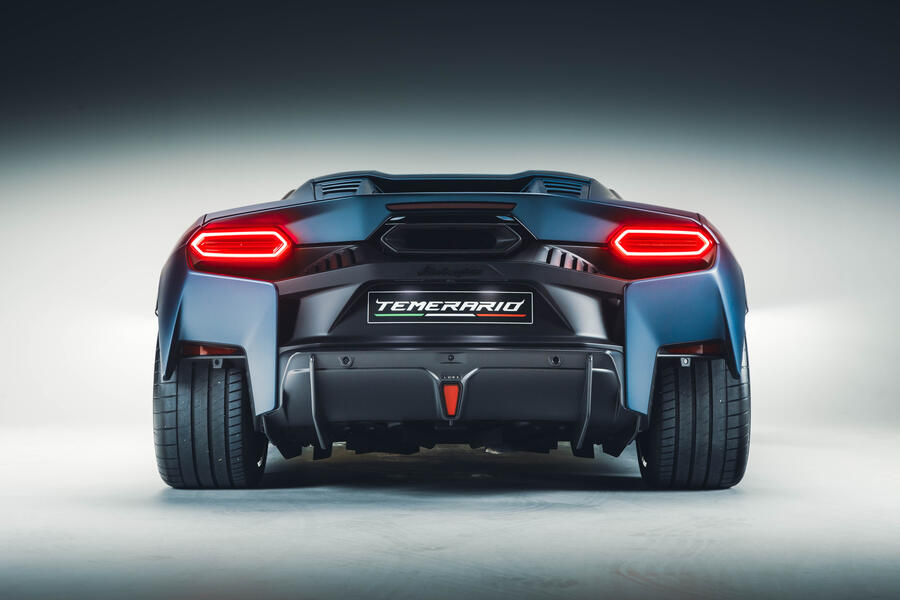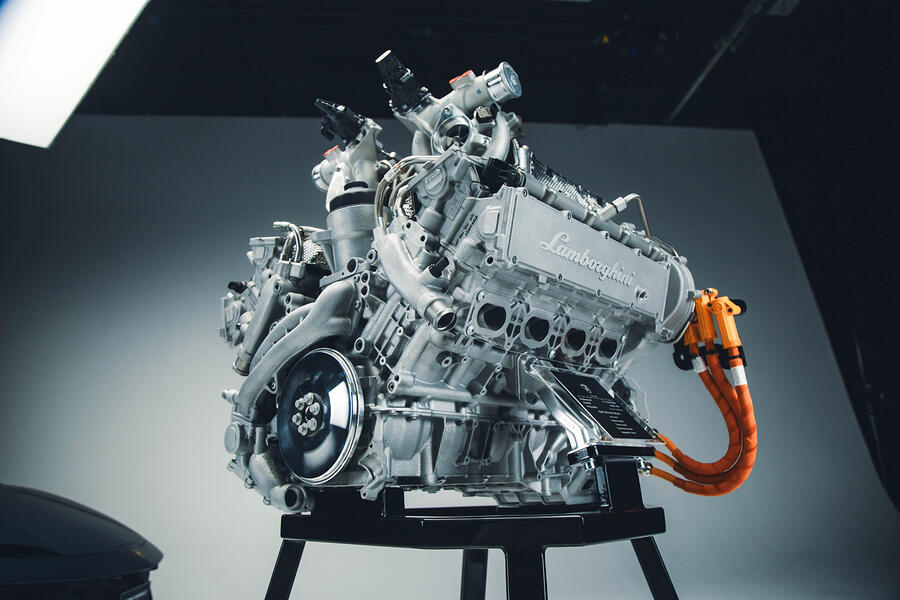Electrifying performance yields 0-62mph sprint time of 2.7sec and a 213mph top speed
Lamborghini has taken the covers off the long-awaited replacement for its Huracán junior supercar: the Temerario.Â
The revered 5.2-litre V10 that has powered Lamborghini’s mainstream supercars since 2003 has been ditched in favour of an all-new twin-turbocharged 4.0-litre V8, assisted by three electric motors.Â
It has a hot-vee layout, meaning the turbos are mounted between the two cylinder banks. One motor is mounted between the engine’s flatplane crankshaft and the gearbox.Â
The other two are mounted on the front axle, affording the Temerario near-silent, front-wheel-drive operation for short distances.Â
Alone, the engine puts out a whopping 789bhp between 9000rpm and 9750rpm, before redlining at 10,000rpm.Â
Add in the motors and output rockets to 907bhp, yielding a 0-62mph sprint time of 2.7sec and a 213mph top speed.Â
The motors contribute a relatively small proportion of the system’s total output because they are used for torque-filling at low revs, mitigating the lag that results from the use of large, high-pressure turbos.Â
They are powered by a small 3.8kWh battery that can be charged by an AC device at rates of up to 7kW.
Design
The Temerario’s dramatic form is in keeping with design chief Mitja Borkert’s ‘spaceship’ ethos, featuring a raft of Lamborghini hallmarks including a gaping hexagonal exhaust and similarly shaped front and rear LEDs.Â
Although clearly related to the flagship Revuelto, the Temerario doesn’t adopt the same Y-shaped lighting graphics, instead distinguishing itself with slimmer front LEDs, giving it a similar look to last year’s Lanzador electric GT concept.Â

The lower section of the Temerario’s rear is cut away, exposing the tyres and making the overhang appear shorter. The Temerario moves away from the carbonfibre and aluminium architecture of the Huracán in favour of a new spaceframe made exclusively of aluminium.
This makes it 20% stiffer, owing in part to use of aluminium extrusion – the construction method used by the featherweight Lotus Elise and Alpine A110.Â
Its dry weight of 1715kg can be cut to as little as 1690kg when equipped with the track-focused Alleggerita (‘lightened’) package.
Hardware
Stopping power comes in the form of 410mm aluminium disc brakes with 10-pot calipers up front and 390mm stoppers with four-pot calipers at the rear.Â
These are said to yield a 62-0mph stopping distance of 32 metres, on a par with the preceding Huracán Tecnica (31.5m).Â
Although the Temerario’s on-paper performance looks similar to that of the larger Revuelto, the two offer distinct characteristics, Lamborghini chief technical officer RouvenÂ
Mohr told Autocar. Whereas the Revuelto is more serious and focused on outright pace, “the Temerario plays the role of the rebel that is challenging you – ‘let’s have fun, let’s have fun!’â€, he said.Â
To that end, the Temerario is the first Lamborghini to offer a drift mode. This uses torque vectoring on the front motors to provide three levels of slip angle.
Mohr said this was inspired by the off-road-ready Huracán Sterrato, adding: “Our customers love this kind of thing, these play tools.â€Â

The interior is designed to make the driver feel like a fighter pilot, with panels that cocoon them within the main controls.Â
Lamborghini chose to give critical controls physical switchgear while secondary functions such as the sat-nav are contained within the 8.4in driver’s display and the passenger’s dashboard mounted 9.1in touchscreen.Â
Although the cockpit is intended to immerse the occupants in the driving experience, there are also concessions to daily usability.Â
The new chassis provides an extra 34mm of head room – said to be enough to allow drivers as tall as 6ft 5in to wear a helmet – and an extra 46mm of leg room.Â
The standard-fit ‘comfort’ seats are also heated and ventilated and offer 18-way electric adjustment.Â
Pricing has yet to be announced, but the Temerario will command a comfortable premium over the £170,000 Huracán, with Lamborghini extensively promoting its Ad Personam personalisation programme, which will offer some 400 colours and liveries.



